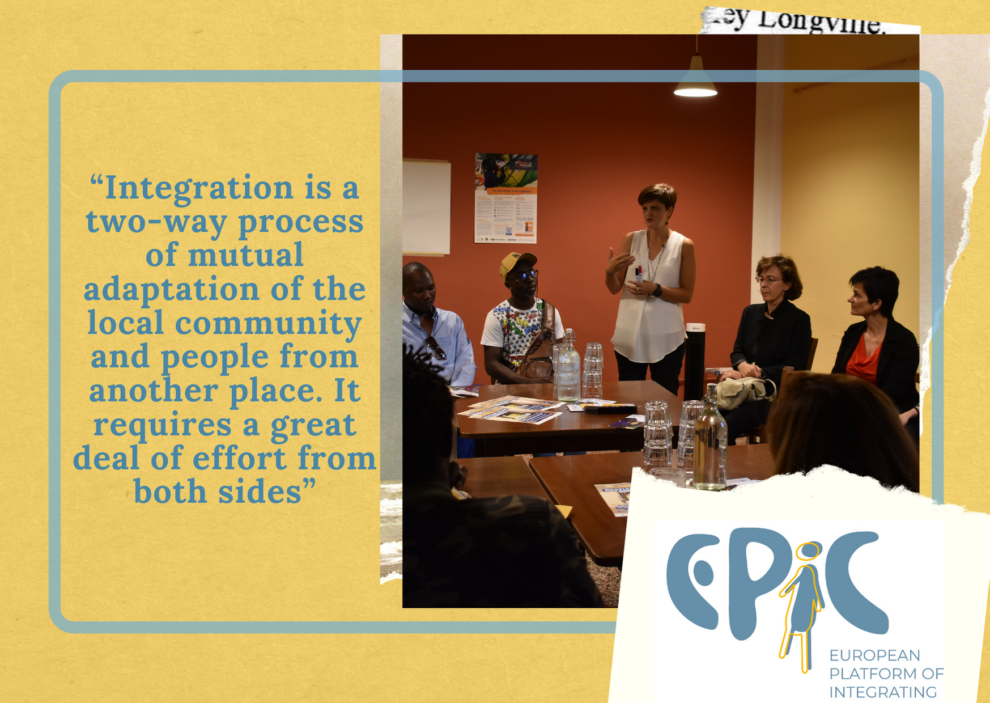
The notions of integration. A reflection from the EPIC research report
To achieve the successful integration of migrants into the receiving community is repeated over and over as being one of the key priorities in the EU policy agenda. But how does successful integration really look like?
Building on the assumption that integration is a multidimensional concept, too complex to be captured by a single factor, EPIC research analysis investigated how 700 inhabitants from around Europe perceived different dimensions of integration (participation, plans, knowledge, networks, belonging and security).
“Integration, in the most general sense, may be any bringing together and uniting of things: the integration of two or more economies, cultures, religions.”; “The gathering of certain elements into one whole”; “to join different units of people”; “to bring together and unite things”
“Integration is, or should be, a process in which, through getting to know each other and exchanging, knowledge, customs, traditions, a new society is created together.”
“For me, integration is about having the same opportunities and rights as local people.”
“In my opinion, the concept of ‘integration’ is not totally positive, because it is based on the existence of two cultures: a dominant one, and a subordinate one which needs to be ‘integrated’, namely assimilated. Sometimes, this process does not take into account the characteristics of different cultures.”
Through this research we attempted to go back once more to the notion of integration, question its foundations, to rethink hospitality and citizenship. The way we did it was primarily through the design of the research methods and a deep reflection on positionality and the relationship between researcher and researched subject. First, we tried to move away from pre-set migranticised categories to let participants define themselves without bias in the surveys and interviews. Secondly, the research was very much shaped by the idea that integration is a form of transformative relation, between people, places and institutions. It is driven by individual choices and collective constraints. It is the way we all build an urban basis for ourselves.
“Integration is Constantly trying to get the people you come to, to accept you. That you can integrate yourself and your culture with them, but not forget your culture… the first thing ‘we learned [about Croatia] was that there was no discrimination and that was enough for us “
“Integration is, or should be, a process in which, through getting to know each other and exchanging knowledge, customs, traditions, a new society is created together.”
“Integration is incorporating new elements into a whole, merging something new with something old. To conform someone or insert something from the outside into the bigger picture”.
“Integration is a two-way process of mutual adaptation of the local community and people from another place. It requires a great deal of effort from both sides.”
“A condition of peaceful coexistence among all those who are not afraid of losing their cultural identity.”
From the exploration of the different dimensions of integration found in our research, we can confirm that there are a number of trends and patterns that have emerged across groups in terms of the priorities in dimensions of achieving integration. However, despite this, priorities for integration certainly can change depending on circumstance, and the needs of a young person newly arrived in a city will differ to that of a more long-standing parent with dependants, or a person born within the territory in their later years experiencing uncertainty over more newly arrived groups.
Therefore, it seems essential to recognise the diversity in trajectories of integration, and that each individual will be situated on a different point or stage of integration. Policy design should recognise these different trajectories, and seek to remove blockages, rather than constraining integration into certain forms.
Our attempt was thus to decolonise the notion of integration by unlinking it from structures of power and privilege, policy and disciplinary language and categories.
“I believe we should instead favor a new meaning in which it [integration] is understood as a dynamic and reciprocal process”
“I decided to participate…to tell my story. To let people know that there are some very capable immigrants, who can get things done on their own, have plans and want to do something. They want to grow up, find a job and get integrated. We are not just criminals or pushers as they read in newspapers. There are also good people, very capable”.
“I understand integration as a lifelong task for all people who want to live in a community. For me, integration always means to give and take, a good measure of tolerance and solidarity intentions. The moment I turn away from my fellow human beings, my integration ends. So integration should be worked on for a lifetime.”